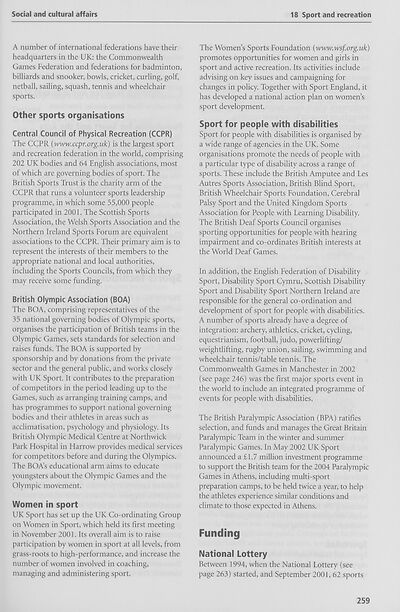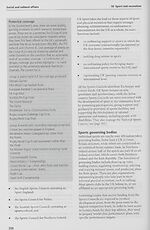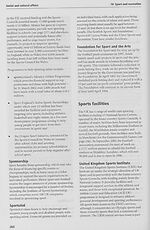Download files
Complete book:
Individual page:
Thumbnail gallery: Grid view | List view

Social and cultural affairs
18 Sport and recreation
A number of international federations have their
headquarters in the UK: the Commonwealth
Games Federation and federations for badminton,
billiards and snooker, bowls, cricket, curling, golf,
netball, sailing, squash, tennis and wheelchair
sports.
Other sports organisations
Central Council of Physical Recreation (CCPR)
The CCPR (www.ccpr.org.uk) is the largest sport
and recreation federation in the world, comprising
202 UK bodies and 64 English associations, most
of which are governing bodies of sport. The
British Sports Trust is the charity arm of the
CCPR that runs a volunteer sports leadership
programme, in which some 55,000 people
participated in 2001. The Scottish Sports
Association, the Welsh Sports Association and the
Northern Ireland Sports Forum are equivalent
associations to the CCPR. Their primary aim is to
represent the interests of their members to the
appropriate national and local authorities,
including the Sports Councils, from which they
may receive some funding.
British Olympic Association (BOA)
The BOA, comprising representatives of the
35 national governing bodies of Olympic sports,
organises the participation of British teams in the
Olympic Games, sets standards for selection and
raises funds. The BOA is supported by
sponsorship and by donations from the private
sector and the general public, and works closely
with UK Sport. It contributes to the preparation
of competitors in the period leading up to the
Games, such as arranging training camps, and
has programmes to support national governing
bodies and their athletes in areas such as
acclimatisation, psychology and physiology. Its
British Olympic Medical Centre at Northwick
Park Hospital in Harrow provides medical services
for competitors before and during the Olympics.
The BOA’s educational arm aims to educate
youngsters about the Olympic Games and the
Olympic movement.
Women in sport
UK Sport has set up the UK Co-ordinating Group
on Women in Sport, which held its first meeting
in November 2001. Its overall aim is to raise
participation by women in sport at all levels, from
grass-roots to high-performance, and increase the
number of women involved in coaching,
managing and administering sport.
The Women’s Sports Foundation (www.wsf.org.uk)
promotes opportunities for women and girls in
sport and active recreation. Its activities include
advising on key issues and campaigning for
changes in policy. Together with Sport England, it
has developed a national action plan on women’s
sport development.
Sport for people with disabilities
Sport for people with disabilities is organised by
a wide range of agencies in the UK. Some
organisations promote the needs of people with
a particular type of disability across a range of
sports. These include the British Amputee and Les
Autres Sports Association, British Blind Sport,
British Wheelchair Sports Foundation, Cerebral
Palsy Sport and the United Kingdom Sports
Association for People with Learning Disability.
The British Deaf Sports Council organises
sporting opportunities for people with hearing
impairment and co-ordinates British interests at
the World Deaf Games.
In addition, the English Federation of Disability
Sport, Disability Sport Cymru, Scottish Disability
Sport and Disability Sport Northern Ireland are
responsible for the general co-ordination and
development of sport for people with disabilities.
A number of sports already have a degree of
integration: archery, athletics, cricket, cycling,
equestrianism, football, judo, powerlifting/
weightlifting, rugby union, sailing, swimming and
wheelchair tennis/table tennis. The
Commonwealth Games in Manchester in 2002
(see page 246) was the first major sports event in
the world to include an integrated programme of
events for people with disabilities.
The British Paralympic Association (BPA) ratifies
selection, and funds and manages the Great Britain
Paralympic Team in the winter and summer
Paralympic Games. In May 2002 UK Sport
announced a £1.7 million investment programme
to support the British team for the 2004 Paralympic
Games in Athens, including multi-sport
preparation camps, to be held twice a year, to help
the athletes experience similar conditions and
climate to those expected in Athens.
Funding
National Lottery
Between 1994, when the National Lottery (see
page 263) started, and September 2001, 62 sports
259
18 Sport and recreation
A number of international federations have their
headquarters in the UK: the Commonwealth
Games Federation and federations for badminton,
billiards and snooker, bowls, cricket, curling, golf,
netball, sailing, squash, tennis and wheelchair
sports.
Other sports organisations
Central Council of Physical Recreation (CCPR)
The CCPR (www.ccpr.org.uk) is the largest sport
and recreation federation in the world, comprising
202 UK bodies and 64 English associations, most
of which are governing bodies of sport. The
British Sports Trust is the charity arm of the
CCPR that runs a volunteer sports leadership
programme, in which some 55,000 people
participated in 2001. The Scottish Sports
Association, the Welsh Sports Association and the
Northern Ireland Sports Forum are equivalent
associations to the CCPR. Their primary aim is to
represent the interests of their members to the
appropriate national and local authorities,
including the Sports Councils, from which they
may receive some funding.
British Olympic Association (BOA)
The BOA, comprising representatives of the
35 national governing bodies of Olympic sports,
organises the participation of British teams in the
Olympic Games, sets standards for selection and
raises funds. The BOA is supported by
sponsorship and by donations from the private
sector and the general public, and works closely
with UK Sport. It contributes to the preparation
of competitors in the period leading up to the
Games, such as arranging training camps, and
has programmes to support national governing
bodies and their athletes in areas such as
acclimatisation, psychology and physiology. Its
British Olympic Medical Centre at Northwick
Park Hospital in Harrow provides medical services
for competitors before and during the Olympics.
The BOA’s educational arm aims to educate
youngsters about the Olympic Games and the
Olympic movement.
Women in sport
UK Sport has set up the UK Co-ordinating Group
on Women in Sport, which held its first meeting
in November 2001. Its overall aim is to raise
participation by women in sport at all levels, from
grass-roots to high-performance, and increase the
number of women involved in coaching,
managing and administering sport.
The Women’s Sports Foundation (www.wsf.org.uk)
promotes opportunities for women and girls in
sport and active recreation. Its activities include
advising on key issues and campaigning for
changes in policy. Together with Sport England, it
has developed a national action plan on women’s
sport development.
Sport for people with disabilities
Sport for people with disabilities is organised by
a wide range of agencies in the UK. Some
organisations promote the needs of people with
a particular type of disability across a range of
sports. These include the British Amputee and Les
Autres Sports Association, British Blind Sport,
British Wheelchair Sports Foundation, Cerebral
Palsy Sport and the United Kingdom Sports
Association for People with Learning Disability.
The British Deaf Sports Council organises
sporting opportunities for people with hearing
impairment and co-ordinates British interests at
the World Deaf Games.
In addition, the English Federation of Disability
Sport, Disability Sport Cymru, Scottish Disability
Sport and Disability Sport Northern Ireland are
responsible for the general co-ordination and
development of sport for people with disabilities.
A number of sports already have a degree of
integration: archery, athletics, cricket, cycling,
equestrianism, football, judo, powerlifting/
weightlifting, rugby union, sailing, swimming and
wheelchair tennis/table tennis. The
Commonwealth Games in Manchester in 2002
(see page 246) was the first major sports event in
the world to include an integrated programme of
events for people with disabilities.
The British Paralympic Association (BPA) ratifies
selection, and funds and manages the Great Britain
Paralympic Team in the winter and summer
Paralympic Games. In May 2002 UK Sport
announced a £1.7 million investment programme
to support the British team for the 2004 Paralympic
Games in Athens, including multi-sport
preparation camps, to be held twice a year, to help
the athletes experience similar conditions and
climate to those expected in Athens.
Funding
National Lottery
Between 1994, when the National Lottery (see
page 263) started, and September 2001, 62 sports
259
Set display mode to:
![]() Universal Viewer |
Universal Viewer | ![]() Mirador |
Large image | Transcription
Mirador |
Large image | Transcription
The item on this page appears courtesy of Office for National Statistics and may be re-used under the Open Government Licence for Public Sector Information.
| Britain and UK handbooks > UK: The official yearbook of the United Kingdom of Great Britain and Northern Ireland > 2003 > (289) |
|---|
| Permanent URL | https://digital.nls.uk/204926867 |
|---|
| Attribution and copyright: |
|
|---|---|
| Description | Three volumes of 'UK: The official yearbook of the United Kingdom of Great Britain and Northern Ireland', published annually by the Office of National Statistics from 2002-2005. |
|---|---|
| Shelfmark | GII.11 SER |
| Description | Three titles produced by the British Government from 1954-2005 describing 'how Britain worked'. They are: 'Britain: An official handbook' (1954-1998), 'Britain: The official yearbook of the United Kingdom' (1999-2001), and 'UK: The official yearbook of the United Kingdom of Great Britain and Northern Ireland' (2002-2005). These 50 reports provide an overview of Britain's economic, social and cultural affairs, its environment, international relations, and the systems of government. They give an impartial summary of government policies and initiatives, and explain how public services are organised. |
|---|---|
| Additional NLS resources: |
|

